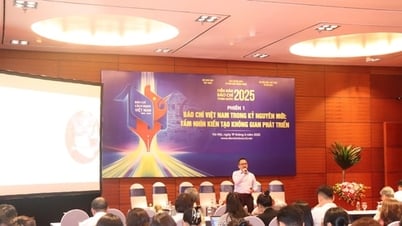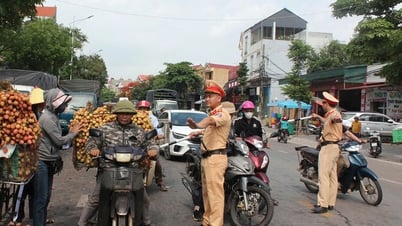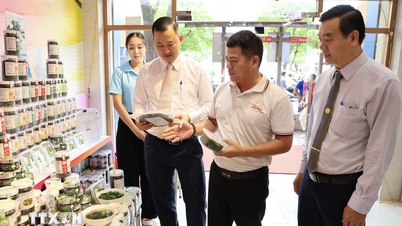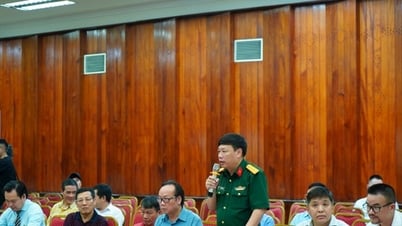Recently, in many localities, especially big cities, many businesses suddenly closed and ceased operations.
According to the Tax Department, a survey shows that there are many reasons, such as fear of being inspected for trading in goods of unknown origin, counterfeit goods, and poor quality goods; misunderstanding or incomplete understanding of tax policies and subjects applying electronic invoices.
According to the provisions of Decree 70/2025/ND-CP amending Decree 123/2020/ND-CP regulating invoices and documents, only business households and individuals who pay taxes by the lump-sum method and have revenue of 1 billion VND/year or more; operating in the fields of retail, restaurants, catering, hotels, supermarkets, passenger transport, entertainment..., selling goods and services directly to consumers are required to deploy electronic invoices generated from cash registers and transfer data to tax authorities.

According to the tax management database, there are currently 37,576 business households nationwide that are required to implement electronic invoices from cash registers, equivalent to about 1% of the total of more than 3.6 million business households.
However, in reality, many small businesses, even those not subject to regulation, have chosen to temporarily suspend operations due to concerns or misunderstandings that all must deploy cash register technology, which means changing processes, increasing investment costs and being subject to close supervision.
In Ho Chi Minh City, according to the Tax Department of Region II, in May 2025, when the authorities were preparing to implement Decree 70/2025/ND-CP, 3,763 business households stopped operating or closed.
However, only 440 of these households (accounting for 3.18%) have revenue of over 1 billion VND and are required to use electronic invoices from cash registers, corresponding to a tax of 1.4 billion VND. Thus, the majority of households that have stopped doing business are not in the group required to apply electronic invoices from cash registers according to regulations.
According to the Tax Department of Region II, up to now, 15,764 business households have implemented electronic invoices from cash registers according to Decree 70/2025/ND-CP, accounting for 6.7% of the total 232,798 business households in the area.
Of these, 11,865 households operate under the contract method and 3,899 households declare. Although accounting for 42.6% of households subject to implementation nationwide, this rate still accounts for only about 0.4% of the total number of business households nationwide.
This confirms that the regulation on electronic invoices only applies to households with revenue of 1 billion VND/year or more and in some specific fields, but confusion is widespread due to incomplete or incorrect information.
Notably, the fact that many businesses have stopped selling coincides with the time when authorities have simultaneously launched inspections and handled violations of smuggling, trade fraud and counterfeit goods under the direction of the Prime Minister .
In just over a month, the forces have discovered many cases related to fake functional foods, poor quality cosmetics, drugs without circulation licenses, milk mixed with chemicals... Fear of being inspected and having their goods traced has caused many businesses to choose to temporarily suspend operations to avoid legal risks.
Some experts say that the temporary suspension of small businesses is not due to changes in tax policies but to concerns, misunderstandings and market pressure.
Faced with this situation, the Ministry of Finance has sent an open letter to the Vietnam Association of Certified Public Accountants, the Vietnam Association of Accountants and Auditors, tax agents, accounting service providers, tax consultants and technology companies, requesting these organizations to actively support taxpayers, especially business households, to ensure the implementation of electronic invoices from cash registers in accordance with regulations, without causing confusion or misunderstanding.
Along with that, the tax departments of the regions also sent letters to business households, clearly affirming the policy of not increasing taxes, not causing difficulties for people, but aiming to increase transparency and prevent budget losses.
The Government also issued Official Dispatch No. 88/CD-TTg dated June 12 requesting ministries, branches and localities to strengthen management and promote the implementation of electronic invoices generated from cash registers in activities of selling goods and providing services directly to consumers.
This is an important step in the process of modernizing the tax system, controlling actual revenue and protecting consumer rights through transparency of transactions.
Regulations on electronic invoices from cash registers with data transfer connections to tax authorities do not change the tax policy currently applied to business households and individuals, but only change the basis for determining revenue to determine the tax rate closer to the actual revenue generated by these households.
This regulation does not affect the business activities of households and individuals with a revenue threshold of less than 1 billion VND/year.
Source: https://hanoimoi.vn/nhieu-ho-kinh-doanh-khong-phai-ap-dung-hoa-don-e-tu-cung-tam-dong-cua-705692.html









































































































Comment (0)